I begin at Lake Ontario, that deepest of the Great Lakes, where the water is still warm and the sandy shorelines remain decidedly un-frozen. I walked across the beach, where confused waves arrive in quick intervals, lapping at the sand, delivering their imports of autumn leaves from Canadian shores in big neat piles. Somber and lifeless — bordering on lugubrious — the sky sighed and blew sideways rain under my hat, and I felt as if I were at the edge of the planet. Kneeling down, I touched the lakewater and found it was still shockingly warm. Had the thermometer dipped only five degrees south we'd have been getting pummeled with lake effect snow as this humidity rose to meet icy winds from the northwest. Instead, the land was enveloped in a forlorn and ceaseless blowing mist; the sort that doesn't deliver the placid relief of a good hard rain but holds the air in wafting vagaries and a quiet, soaking sense of dislocation.
Along the downhill road that takes a motorist from the town of Adams to the beach, the creeks and streams were flowing madly like overtired children on a hellacious sugar binge. The weeks of rain had amped them up, egging them on, causing their banks to open up like veins to fill the swamps with acres and acres of water. In summertime, such rains might evoke a sense of calm satisfaction among the local farmers, prompting them to utter the old country truism as the drops fell: "Aw, we needed this." But today the Tug Hill and Ontario coastline regions don't seem to need it — in fact, this massive amount of water almost seems useless as it falls on resting fields and forests of sleeping maple. Now, rain didn't seem to be falling as a gratitude-inducing element of a well-ordered world of water — it seemed to be a directionless and dreary non sequitur.
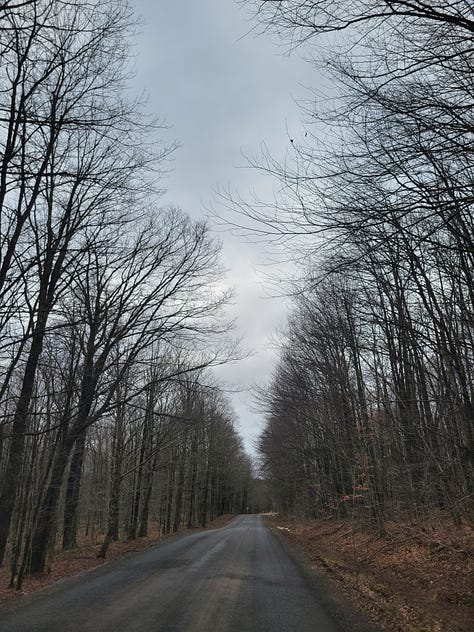
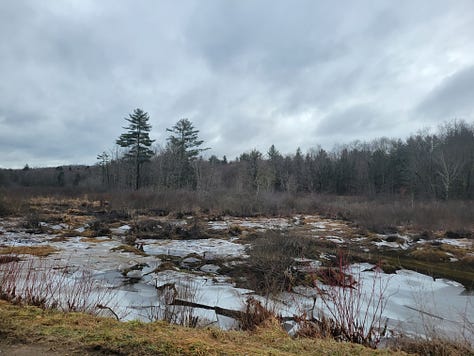

In former days, the lake's vaporous haze would blow east after lingering above her quiet surface, rising high into billowing towers of snowstorm clouds. Like a battery for the sun's summer heat, the water would store the warmth of July and August as a bulwark against winter's arrival — only to spend it all in a great loft of humidity that would bless the Tug Hill region of New York State with feet upon feet of thick, wet snows. This region — with a population density on par with that of New Mexico — would revel in it. Just as one began to hear "Jingle Bells" on the radio and to sink their teeth into a work lunch of leftover turkey and cranberry sauce, the first flurries would arrive as a mitzvah to backwoods towns like Orwell and Martinsburg. Like a thousand streams of tinsel had been hung along the boughs of spruces and twiggy, leafless poplars, the snow brightened the world and told all that the gaeity of constant snowfall had begun — and was not to end until April. The idea of rain after the first week of December was seen as generally unthinkable at one time. Later, the thought would be regarded as unlikely — until today, when it now appears to be an inevitable and joyless pattern, extending the dark and deathly brownness of late autumn.
Before the steady decline of the Tug Hill winter, the week between Christmas and New Years — this week — was a major "moneymaker" for almost all ski resorts, snowmobile bars, and hotels in the state. Thousands of Americans from as far away as New Jersey and Maryland would load up their trucks with mittens, hats, snowpants, snowmobiles, and cases of beer to trek New York State's 400+ miles of snowmobile trails or to visit our ski resorts. Others would rent cabins beside ski resorts like Snow Ridge and Woods Valley to ski endless short runs of waist-deep "powder" in the woods. Few know that New York has more ski resorts than any other state in the Union — but barely any are presently open. And the operators of the institutions that made such recreation possible were often booked years in advance, working round the clock to ensure that they could meet the stiffly consistent — and at times overwhelming — demand for their hotel rooms, pints at the bar, burgers, and chairlift rides.
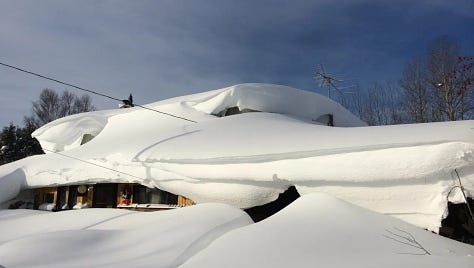
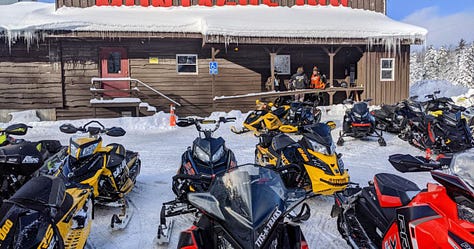
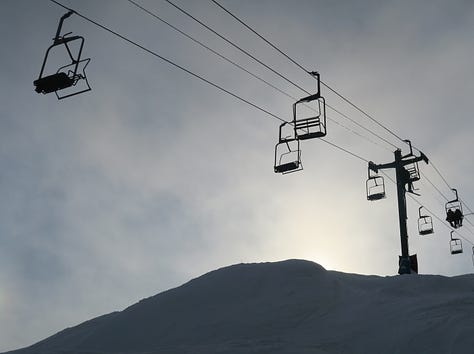
Now, most everyone I met on the Tug Hill seemed bored. The roads were empty, and nearly every seasonal camp I saw was still boarded up for the season. Yards were flooded, and it appeared the signage installed along the snowmobile trails had been installed in vain. Of course I'd known that the snow was largely absent from the region before I'd opted to visit — but nevertheless, the brown fields and lifeless woods made the hairs stand up on the back of my neck. Having grown up in “the snow belt” as a boy, after some years away the absence of real snow by late December struck me with a physiological sense of confusion. In the bars and taverns, there was talk of which ones might shut down for good. And in some of the area's towns, there were plentiful signs that the decline of the Upstate winter had already dealt a financial blow — shuttered bars presided over voidlike streets where few cars passed. Some had studded snow-tires that clicked against the wet iceless pavement, purposelessly.
Were it not for a few signs of the region's former salad days as a major snowmobiling destination, one might not know that any such era had passed there. Snowmobile association clubhouses and snow fencing were everywhere in the mud, and camps with signs bearing the insignias of companies like Bombardier and Arctic Cat were plentiful. The snowmobilers were clearly a jocular bunch; one sign in the style of the Department of Environmental Conservation's state forest signs — hanging placards of brown wood with yellow letters — bore the words "Girls and Gunpowder Private Land, 525 Acres, State of New York Department of Fun & Guns". Above this, a sign was nailed that simply stated: "BIDEN SUCKS". No fun, guns, or girls appeared present at the locked-up cabin, but it was obvious that these sorts of places had hosted many parties of great notoriety over the years.

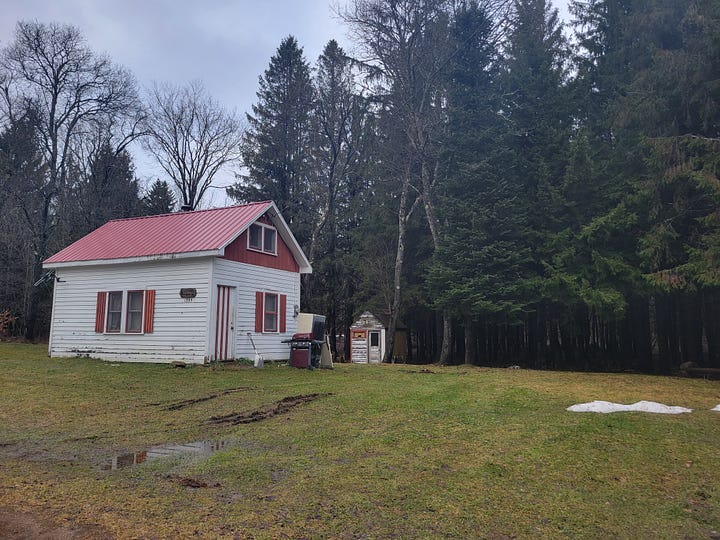
I had hoped, in visiting, to have a few more conversations than I did — but countless bars and restaurants were operating either on limited hours or had shut down entirely, opting to remain closed until the snow came. When that would be, few could say. "January fourth," a man at the bar at Montague Inn said somberly, turning back to his beer in silence. I checked the forecast myself — light flurries on the fourth were the only snow in the forecast. Discussion about the absence of snowfall was, particularly amongst the men at the few open bars, a sore subject, any reminder of which induced aggrieved tipples and exasperated breaths. Others simply stared blankly at any inquiry about the weak winter, perhaps on the principle that there was nothing to say. Clearly, there were many who were lingering at these establishments on the off-chance that the Lake Ontario "snow machine" might decide to fire up. For a number of them, these days off work might've represented their only vacations for the year — and in lieu of snow, they'd opted to slug Labbatt Blue in quiet desperation, glumly checking the weather forecast on their smartphones and half-watching hockey.
In surveying them at the three open establishments I found — The “World Famous” Osceola Hotel, the Highmarket Inn, and the Montague Inn — I couldn't help but think of two recent books I'd read. The first was called This Cold Heaven: Seven Seasons in Greenland by Gretel Ehrlich, and the second was called A Desert Dies by Michael Asher. In both, the authors interface directly with indigenous peoples for whom changing weather patterns present locals with crises of identity. In A Desert Dies, a Kababish nomad named Habjur makes his lamentation to Mr. Asher, a British man who has embedded himself with the nomadic Arabs who'd been forced by drought to go south to Sudan in 1983:
"I do not like this country. These blacks stop us watering our herds. They hold us back at the watering-place and say, 'The wells are dry!' or they tell us, 'Pay us money and we will let you water!' Curse their fathers! In the old days the Kababish would not come near this land of blacks! The grazing was good in the north then. You could stay in the desert and find everything you needed. If you wanted meat there were oryx and ostrich to hunt. Where are they now? I have not seen an ostrich in two years, by God! The best ranges have gone and we come further south every year!"
In Greenland, Ms. Ehrlich wrote:
"The crisis was that the fjords had not iced over. Without ice, there was no way to get to the other villages. We were prisoners on an Eskimo Alcatraz ... When I asked the sled maker if the fjord would freeze, he looked out the window and shrugged ... mid-January and still no ice. A hundred years ago, the failure of the ice would have meant certain starvation: if there was no ice on which to travel, there was no way to hunt ... An old woman standing next to me says, 'If people go out, they will die. They will fall through the ice and go down to where the sea goddess lives. No one knows about the ice anymore.'"
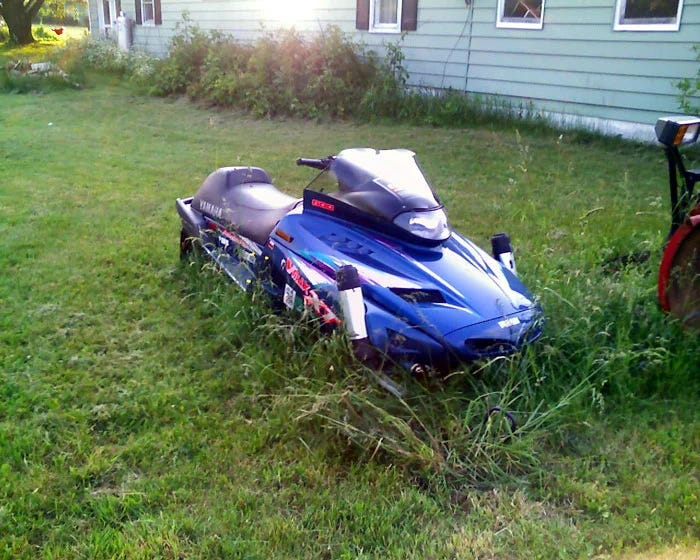

These quotes jumped off the pages of my journal as I stared out at the nearly-empty Montague Inn, where I'd rented a room across the road at half-price. The Kababish nomad, the Greenlandic seal hunter, and the Tug Hill resident seemed to me then to have something in common. Just as the iceless fjord glowers at the Inuit youth as a symbol of his detention and lost hunting opportunities, and the nomad's bitter and parched journey south drives him to anger, the misty rain hanging above Lake Ontario's iceless shore stares down at the empty bars and inns of the Tug Hill Plateau. As the margins of these establishments grow thinner and the black line above the break-even point sinks, nostalgia for the "good old days" follows, and a sense that something is wrong — not merely on the level of weather or finances, but a vague ontological wrongness — becomes unavoidable. When one's livelihood and way of life are thorough expressions of a land's character, a change in that land can provoke a slow, liminal loss of identity and existential confusion that evades comprehension or clarity. The Tug Hill man blames it on El Niño and quietly proceeds, befuddled.
To call this "climate change" is to miss the point; in fact, most residents of this place seem to actively scorn such a label. This scorn does not originate in the possibility that their own scholarship on the matter exceeds that of the scientific community, nor does it stem from any contrary observations they've made in their life on the land. They can see quite plainly that something is changing and cannot deny it. Rather, I believe it stems from a certain cynicism about identifying the source of their region's difficulties with a foreign concept thrust upon them by their political enemies. If they admitted climate change were the root cause of their woes, what difference would it make? The day after the snowmobile shop owner decides that climate change is the problem — it will still be raining, and his shop will still be empty.
Meanwhile, the "solutions" proposed by those who "believe in" climate change appear ludicrous to provincial folk with a nuts-and-bolts eye for technological practicality and energetic efficacy. Any farmer knows that if you spend all day working on something that in the end will only save you one day's work — you've wasted a day. And indeed, as residents of Lewis County observe the wind farms which have proliferated across their beloved countryside at the behest of distant bureaucrats in Albany and Manhattan, the entire charade appears to be a sort of "Kentucky do-nothin' machine". Companies drive diesel trucks to mine for ore, manufacture plastics in coal-fired power-plants, and ship the whole mess on diesel-powered ships and in gas-hog eighteen-wheelers to obtain a dubious payout of electricity that will suffer a 7% loss in transmission? A fool’s errand. Hard-nosed country people might refer to such a setup as one way to "piss up a long rope". Without the blissful sort of ignorance that could energize people to throw themselves behind the idea of "going green," accepting the consensus on climate change strikes as a total non sequitur; the sort of thing that would only win a man the very dubious benefit of impressing his liberal friends and nothing more.
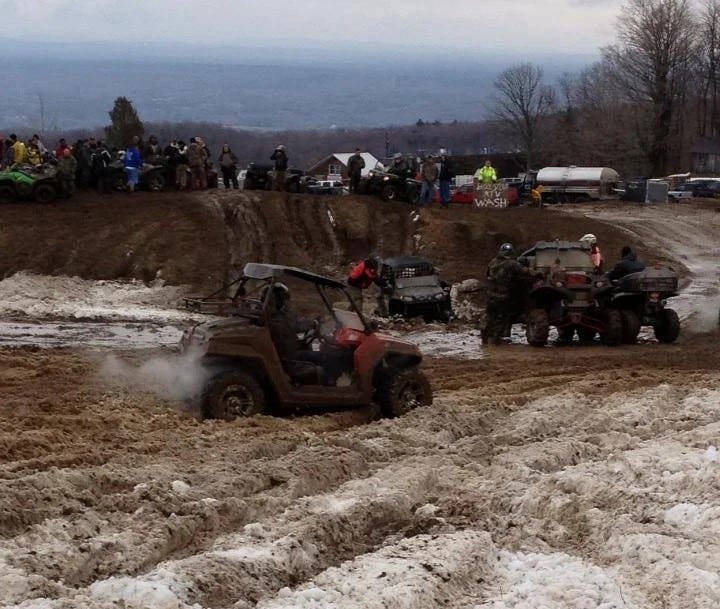
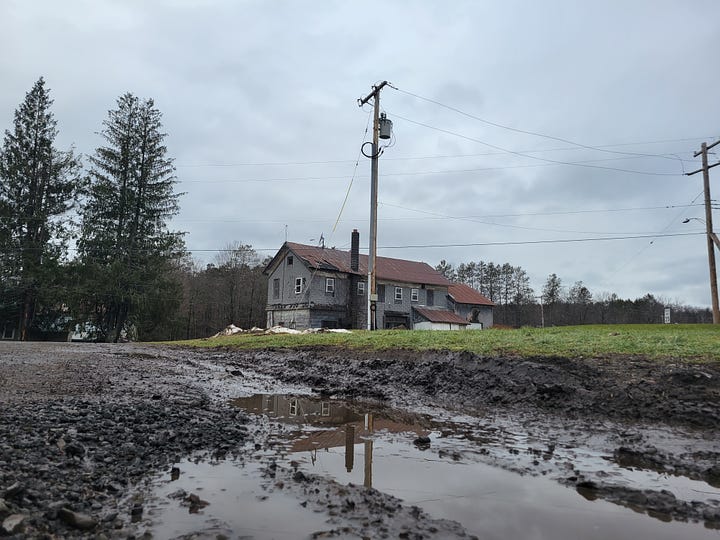
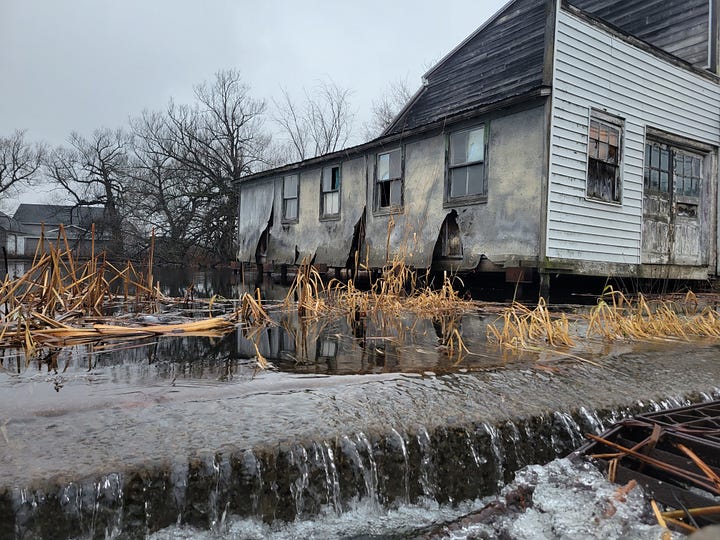
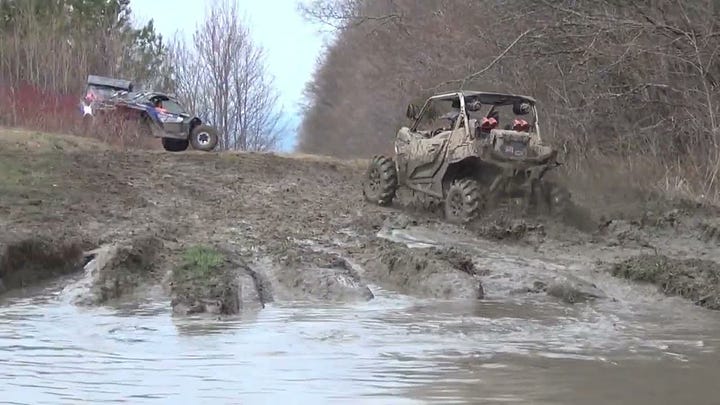
Like the Kababish and the Inuit, the venerable folks on the Tug Hill seem to quietly understand that their future will be different — and are resigned to the inevitability of the change, forced to focus on adaptation. When I visited the Redfield General Store for a bite of breakfast, the cashiers seemed to think that UTV's — also known as 'side-by-sides' — will be the wave of the future in Lewis County. While ATV’s are legal to operate on county roads, these open-air off-road vehicles can coat their riders in thick mud as they proceed through the rough trails in the unpopulated 400-square-mile “core region” of the Tug Hill forest. The UTV, by contrast, is enclosed and keeps its occupant dry and warm, thereby extending the climatic range in which its rider can operate, and keeping him clean and dry enough to easily hit the bars. The cashiers in Redfield seemed to think that these vehicles would supplant at least some of the lost tourism revenue in the county:
But not all. Both UTV’s and ATV’s are known to tear horrific muddy gashes across wet and snow-covered fields — and the private landowners who own much of the snowmobile trail corridor would not be inclined to allow such a disruptive force to be unleashed on their acreage. Snowmobiles merely ride above the land above feet of packed snow — UTV’s, however, slice down into it, ravaging the soil and digging big pits of mud with the deep ridges of their tires. This is especially true when a thin layer of snow covers the mud. Therefore, there are conditions in which the snow is too thin to run a snowmobile and too thick to run a UTV — and these are the conditions that are now normal for increasingly long periods of time on the Tug Hill Plateau. Periods where this is the case will continue to represent lost tourism dollars to area business owners, a majority of whom who rely solely on recreation commerce for their living.
I wish there were a ‘happy ending’ for those who inhabit the Lesser Wilderness. I’m not sure there is. This land has always been a land of inconvenience and marginality, and the arrival of “snow machines” in the 1960’s and 70’s offered an economic boon to the area only relatively recently. Perhaps it will have proven to be a brief and memorable chapter in a region with a history of hardscrabble farming, rough logging, and perhaps above all — departure for easier places. What the future holds for those who manage to stick around here is unknowable. For now, there are plenty of snowmobiles for sale — and the snow is supposed to “start up” on January fourth. We’ll see how the season shapes up.




I remember a few years back, not long after settling near Ithaca full time, myself and some friends drove up to Turin, NY, on the far east side of the Tug Hill plateau to go snowboarding.
I couldn't believe the amount of snow they had, it was surreal, and I hadn't seen anywhere that amount except at elevation in British Columbia.
The empty platitudes from the climate change crowd really are frustrating, especially in light of the fact that their solutions are farting in the wind compared to what nature has in store for us. The cycle of Solar Minimums and Maximums, and this ridiculous undersea volcano that blew more water vapor into the atmosphere last year than ever in recorded history ... these challenges will not be overcome with bureaucracies steering ever more stolen funds (or funds summoned from the ether) to the construction of green idolatry.
Loving your reportage, despite the bad news putting literal Gum on your Shoes.
Thanks, one nit pick. Superior has an average depth much greater than Ontario. Slightly deeper than Huron and far deeper than Erie, the smallest Great Lake surface area of Ontario confuses the casual observer.